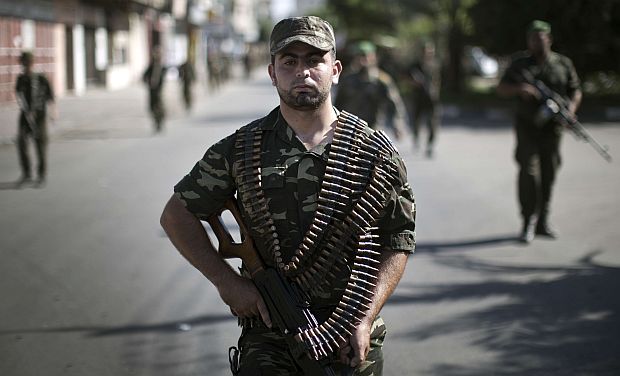
Palestinian Hamas security forces march in the streets of Gaza City on September 25, 2013. (AFP/Mhamud Hams)
Ramallah, Asharq Al-Awsat—Leading Palestinian Salafist Jihadist figure, Abu Abdullah Al-Maqdisi, informed Asharq Al-Awsat that there has been significant communication and contact between Hamas and the Gaza Strip’s Salafist-Jihadist front over the past months to resolve the disagreements between the two .
Al-Maqdisi said that these contacts have taken place through well-known Muslim clerics acting as intermediaries and aim to reach a political settlement between the two trends following years of bloody confrontations. He said, “Within a short period of time, perhaps a month or two at most, the final agreement will be announced.”
Maqdisi informed Asharq Al-Awsat that the mediation put in place an initial agreement to put in place a lasting solution within six months, adding that the negotiations are “heading in the right direction.”
Sources informed Asharq Al-Awsat that clerics from Kuwait and Qatar visited the Gaza Strip last May, accompanied by well-known Egyptian cleric Sheikh Yusuf Al-Qaradawi, chairman of International Union for Muslim Scholars (IUMS). The Gulf clerics have been involved in seeking an amicable end to the ongoing disputes between Hamas and the Salafists.
Qaradawi and the other clerics met with both sides in lengthy talks to resolve the escalating conflict which has led to a number of Salafists being arrested and killed in the Gaza Strip by the ruling Hamas movement.
Maqdisi said: “All parties initially agreed to show good faith until the signing of the final agreement, and this has now taken place.”
Hamas’s relations with the Salafist movements in the Gaza Strip have been tense. Over the past few years, Hamas launched a number of fierce attacks targeting Gaza’s Salafist factions, killing a number of well-known Salafist leaders including Abu Noor Al-Maqdisi in 2009. The Salafists have criticized Hamas’s stance on Israel and the unofficial ceasefire between the Muslim Brotherhood-affiliated movement and Tel Aviv, firing rockets into Israel and publicly seeking to depose the group and establish an Islamic state in the Gaza Strip.
For its part, Hamas has accused the Salafist factions of practicing takfirism and harming the social fabric of the Gaza Strip through its acts of violence and murder, including the targeting of state institutions.
Relations between Hamas and Gaza’s Salafaist factions have been historically rocky, however tensions increased to unprecedented levels last year after the Salafists accused Hamas of working with Egypt—then under the rule of the Muslim Brotherhood—to investigate security attacks.
Following the ouster of Muslim Brotherhood-affiliated President Mohamed Mursi, Hamas continued its crackdown against the Salafists, pledging to eradicate them from the Gaza Strip “by the roots.”
Hamas and the Salafist factions are now in the process of discussing an 8-point initiative to normalize relations. The initial agreement had encompassed 26 points, but these were narrowed down with the help of foreign mediators.
Speaking to Asharq Al-Awsat, Maqdisi said: “The mediators played an important role in developing and formulating the final points of the initiative,” adding, ” “The dialogue between us and Hamas is ongoing.”
The 8-point agreement reportedly includes clauses granting the Salafists freedom to operate in politics, the military, religious advocacy, and civil and social organizations. It also includes an explicit end to the phenomenon of political assassinations and the formulation of a joint committee to deal with any disputes that could lead to new crisis between the two groups.
In return for this, the jihadist Salafist factions will commit to the ceasefire and other decisions made by the ruling Hamas movement.
The Salafists, however, have also requested compensation for their members killed in the attack on Ibn Taymiyah mosque in 2009, which killed Abu Noor Al-Maqdisi and a number of his followers. The Salafists have also demanded the return of all weapons confiscated from them, and the release of its detainees.
Hamas is not expected to comply with the last demands, leaving the 8-point agreement up in the air.
A Gaza source, speaking to Asharq Al-Awsat on the condition of anonymity, confirmed that the arrest and harassment of Salafists have ceased recently and that many Salafist detainees have been released by Hamas.
